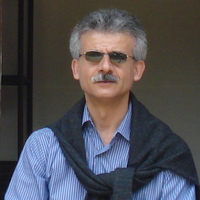Michio Itō’s Reminiscences of Ezra Pound, W. B. Yeats, and Other Matters: A Translation and Critical Edition of a Seminal Document in Modernist Aesthetics, 2018
A full text of this book can be viewed at David Ewick's Academia.edu site.
Abstract:
Michio I... more A full text of this book can be viewed at David Ewick's Academia.edu site.
Abstract:
Michio Itō’s Reminiscences of Ezra Pound, W. B. Yeats, and Other Matters:
A Translation and Critical Edition of a Seminal Document in Modernist Aesthetics
Translated by postgraduate students in the Department of Literature and Culture in English at Tokyo Women’s Christian University, edited and with critical introduction and notes by David Ewick and Dorsey Kleitz.
The dancer and choreographer Michio Itō (1893-1961) was a central figure not only in the development of modern dance and performance, but also, by way of a most unlikely series of events, an instrumental figure in the development of transnational European and American literary modernism. This came about by way of Itō’s meeting and friendship with Ezra Pound, W. B. Yeats, and other seminal figures in modernist London and elsewhere in Europe in the second decade of the twentieth century. These led to the then twenty-two-year-old Itō’s role as choreographer and lead dancer in the first performances of Yeats’s Noh-inspired play, At the Hawk’s Well—“the tragic image that has stirred my imagination,” Yeats famously called him— as well as determinative effects in other centrally-important modernist texts, including Pound’s mediations of Japanese subjects, from his early-century work with Ernest Fenollosa’s Noh manuscripts to intertextual forms and presences from these in The Cantos.
Michio Itō’s Reminiscences is the first full English translation of the most important primary source in the tracing of this history. The original text is a transcription of a talk Itō gave in Japanese at Tokyo Woman’s Christian University in December 1955, “Omoide wo kataru: Taka no i shutsuen no koto nado,” “Reminiscences: On Appearing in At the Hawk’s Well and other matters,” which in 1956 was printed in Hikaku bunka, the journal of the Institute of Comparative Studies of Culture at Tokyo Woman’s Christian University. In an informal and uncompromisingly jovial style, Itō provides the fullest account available of his European sojourn, with an improbable trip to Egypt and fateful meeting with a barefoot Arab astronomer along the way, and his relations with luminaries of the period, Pound, Yeats, Edmund Dulac, Claude Debussy, Auguste Rodin, Vaslav Nijinsky, Isadora Duncan, Émile Jaques-Dalcroze, amongst others, and also major Japanese modernist figures living in London at the time, the avant-garde painter Tamijūrō Kume and Shirakaba-ha novelist Torahiko Kōri amongst them.
Two earlier partial translations of “Omoide wo kataru” have appeared in English, neither more than two-hundred words and both punctuated with errors. The text is of enough importance to modernist and performance studies, however, that these earlier partial translations, errors included, have been quoted in dozens of subsequent critical works.
This work corrects the errors and provides the first full scholarly attention Itō’s “Reminiscences” deserves. The translation is by postgraduate students in the Department of Literature and Culture in English at Tokyo Woman’s Christian University, working under the supervision of Tateo Imamura, and edited by David Ewick and Dorsey Kleitz. The work includes a biographical and critical introduction and critical and contextualizing notes by Ewick and Kleitz, a preface by Michele Ito, Itō’s granddaughter and Director of the Michio Ito Foundation, a foreword by John Gery, Research Professor at the University of New Orleans and Director of the Ezra Pound Center for Literature at Brunnenburg Castle, and an authorized reprint of the original Japanese text of the talk as it appeared in Hikaku bunka in 1956.
A full text of the book can be accessed at David Ewick's Academia.edu site.











Uploads
Papers by Dorsey Kleitz
Abstract:
Michio Itō’s Reminiscences of Ezra Pound, W. B. Yeats, and Other Matters:
A Translation and Critical Edition of a Seminal Document in Modernist Aesthetics
Translated by postgraduate students in the Department of Literature and Culture in English at Tokyo Women’s Christian University, edited and with critical introduction and notes by David Ewick and Dorsey Kleitz.
The dancer and choreographer Michio Itō (1893-1961) was a central figure not only in the development of modern dance and performance, but also, by way of a most unlikely series of events, an instrumental figure in the development of transnational European and American literary modernism. This came about by way of Itō’s meeting and friendship with Ezra Pound, W. B. Yeats, and other seminal figures in modernist London and elsewhere in Europe in the second decade of the twentieth century. These led to the then twenty-two-year-old Itō’s role as choreographer and lead dancer in the first performances of Yeats’s Noh-inspired play, At the Hawk’s Well—“the tragic image that has stirred my imagination,” Yeats famously called him— as well as determinative effects in other centrally-important modernist texts, including Pound’s mediations of Japanese subjects, from his early-century work with Ernest Fenollosa’s Noh manuscripts to intertextual forms and presences from these in The Cantos.
Michio Itō’s Reminiscences is the first full English translation of the most important primary source in the tracing of this history. The original text is a transcription of a talk Itō gave in Japanese at Tokyo Woman’s Christian University in December 1955, “Omoide wo kataru: Taka no i shutsuen no koto nado,” “Reminiscences: On Appearing in At the Hawk’s Well and other matters,” which in 1956 was printed in Hikaku bunka, the journal of the Institute of Comparative Studies of Culture at Tokyo Woman’s Christian University. In an informal and uncompromisingly jovial style, Itō provides the fullest account available of his European sojourn, with an improbable trip to Egypt and fateful meeting with a barefoot Arab astronomer along the way, and his relations with luminaries of the period, Pound, Yeats, Edmund Dulac, Claude Debussy, Auguste Rodin, Vaslav Nijinsky, Isadora Duncan, Émile Jaques-Dalcroze, amongst others, and also major Japanese modernist figures living in London at the time, the avant-garde painter Tamijūrō Kume and Shirakaba-ha novelist Torahiko Kōri amongst them.
Two earlier partial translations of “Omoide wo kataru” have appeared in English, neither more than two-hundred words and both punctuated with errors. The text is of enough importance to modernist and performance studies, however, that these earlier partial translations, errors included, have been quoted in dozens of subsequent critical works.
This work corrects the errors and provides the first full scholarly attention Itō’s “Reminiscences” deserves. The translation is by postgraduate students in the Department of Literature and Culture in English at Tokyo Woman’s Christian University, working under the supervision of Tateo Imamura, and edited by David Ewick and Dorsey Kleitz. The work includes a biographical and critical introduction and critical and contextualizing notes by Ewick and Kleitz, a preface by Michele Ito, Itō’s granddaughter and Director of the Michio Ito Foundation, a foreword by John Gery, Research Professor at the University of New Orleans and Director of the Ezra Pound Center for Literature at Brunnenburg Castle, and an authorized reprint of the original Japanese text of the talk as it appeared in Hikaku bunka in 1956.
A full text of the book can be accessed at David Ewick's Academia.edu site.